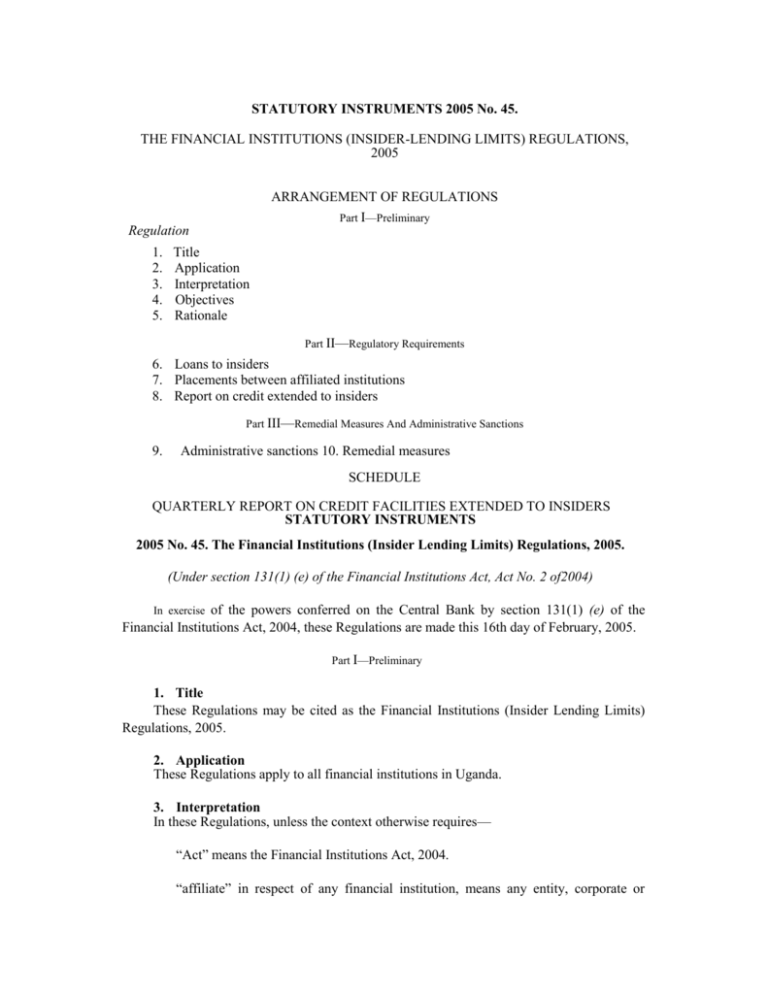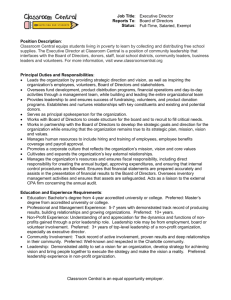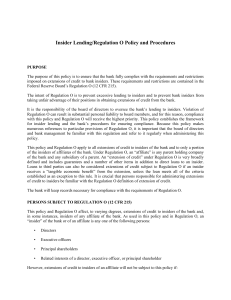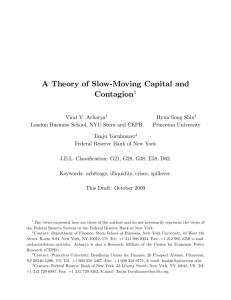si-45
advertisement

STATUTORY INSTRUMENTS 2005 No. 45. THE FINANCIAL INSTITUTIONS (INSIDER-LENDING LIMITS) REGULATIONS, 2005 ARRANGEMENT OF REGULATIONS Part I—Preliminary Regulation 1. 2. 3. 4. 5. Title Application Interpretation Objectives Rationale Part II—Regulatory Requirements 6. Loans to insiders 7. Placements between affiliated institutions 8. Report on credit extended to insiders Part III—Remedial Measures And Administrative Sanctions 9. Administrative sanctions 10. Remedial measures SCHEDULE QUARTERLY REPORT ON CREDIT FACILITIES EXTENDED TO INSIDERS STATUTORY INSTRUMENTS 2005 No. 45. The Financial Institutions (Insider Lending Limits) Regulations, 2005. (Under section 131(1) (e) of the Financial Institutions Act, Act No. 2 of2004) In exercise of the powers conferred on the Central Bank by section 131(1) (e) of the Financial Institutions Act, 2004, these Regulations are made this 16th day of February, 2005. Part I—Preliminary 1. Title These Regulations may be cited as the Financial Institutions (Insider Lending Limits) Regulations, 2005. 2. Application These Regulations apply to all financial institutions in Uganda. 3. Interpretation In these Regulations, unless the context otherwise requires— “Act” means the Financial Institutions Act, 2004. “affiliate” in respect of any financial institution, means any entity, corporate or unincorporated, where 5% or more of any class of its voting shares or other voting participation is directly or indirectly owned or controlled by that financial institution, or is held by it with power to vote; “associate” means— (a) in relation to a natural person— (i) where the relationship is through marriage; includes wife, husband, mother or father in law, wife or husband’s sister, wife or husband’s brother; (ii) where the relationship is through consanguinity; includes father, mother, sister, brother, son, daughter, niece, nephew, grandson or granddaughter, maternal or paternal uncle or aunt or cousin-german; (iii) any company of which that person is a director; (iv) any person who is an employee or partner of that person; (b) in relation to a company; any company which enjoys common share holding or common shareholders with another company directly or indirectly; and (c) in relation to trusts; the trustees of any settlement in which that person is a beneficiary. “control” means the relationship between the parent undertaking and a subsidiary undertaking or similar relations between an individual and an undertaking or the power to determine the financial and operational policies of a financial institution pursuant to its charter, or to an agreement, or direct or indirect influence by a person over the decision-making and management of a financial institution; “credit accommodation” includes contractual commitments to lend, letters of credit and guarantees issued on behalf of any persons; “director” means a natural person occupying the position of a director, by whatever name called, of a body corporate; “employee” means salaried employees of the institution and includes executive directors of the institution; “insider” means a director or person who has executive authority or a shareholder of a financial institution and includes any related person and any related interest of that person; “non-preferential” when used in reference to a credit transaction; means upon terms not more favourable than those which would be offered under prevailing conditions to noninsiders; “officer” includes a person who carries out or is empowered to carry out functions relating to the direction of a financial institution; “related interest” means interests of affiliates, associates and their related persons and the business interests of any of them; “related person” or “group of related persons” means— (a) in relation to natural persons— (i) an associate or close relative of the person; (ii) any person who has entered into an agreement or arrangement with the first-mentioned person, relating to the acquisition, holding or disposal of, or the exercising of voting rights in respect of shares in the financial institution in question; (b) in relation to a company, means— (i) any subsidiary or holding company of that company, any other subsidiary of that holding company and any other company of which that holding company is a subsidiary; (ii) any associate of the company; (c) in relation to a non- natural person which is not a company, means another non-natural person which would have been a subsidiary of the first mentioned non-natural person— (i) had the first-mentioned non-natural person been a company; or (ii) where that other non-natural person is not a company; had both the first mentioned non-natural person and that other non-natural person been a company; (d) any person in accordance with whose direct or indirect directions or instructions the Board of Directors, or where the non- natural person is not a company; the governing body of that non-natural person is accustomed to act; and (e) in relation to any person— (i) any non-natural person of which the Board of Directors or, where that non-natural person is not a company; of which the governing body is accustomed to act in accordance with directions or instructions of the person first- mentioned in this paragraph; and (ii) includes any trust controlled or administered by that person; “salary” means the basic salary plus any fixed fringe benefits that are paid to the officer, employee or director on a regular and periodic basis as part of his or her compensation for services rendered to the financial institution, but excluding the benefits, the entitlement to which depends on a contingency such as medical and hospitalisation benefits, or allowances for attending seminars and board or committee meetings, or other non-cash benefits. 4. Objectives The objectives of these Regulations are— (a) to require that financial institutions follow sound practices with regard to all extension of credit; (b) to promote arm’s length relationships in dealings between financial institutions and their affiliates or associates, directors, officers, shareholders and their related interests; and (c) to promote public confidence in financial institutions through ensuring that no undue favoritism is extended to insiders of financial institutions. 5. Rationale The rationale for these Regulations is that— (a) financial institutions knowingly assume credit risks but where the credit risk exposure is to insiders, the institution can be subject to undue influence and abuse by the insiders; (b) financial institution failures and crises in many countries have been attributed in large part, to abuses of credit extended to insiders where the credit has not been subject to proper credit standards or extended on nonpreferential terms; and it is the proper role of the regulatory and supervisory authority, to prevent such potential abuses. Part II—Regulatory Requirements 6. Loans to insiders (1) The restrictions and limits in sub-regulations (2) to (7) apply to insider lending. (2) A loan or credit accommodation to a financial institution’s affiliates, associates, directors, officers, persons with executive authority, substantial shareholders or any of their related persons or group of related persons or their related interests shall— (a) be granted on non-preferential terms; (b) not in the aggregate, exceed 20% of the lending institution’s core capital; and (c) at all times, be secured by collateral having market value of at least 120% of the outstanding amount of the accommodation throughout its term. (3) The collateral required in subregulation (2) (c) shall be assigned to the financial institution and shall at all times be enforceable and realisable. (4) Aggregate loans or credit accommodations to any one employee, including an executive director of a financial institution, shall not exceed his or her two years’ salary, except that this prohibition shall not apply to secured loans used to finance the purchase or construction of a primary residence, which may aggregate up to three times the annual gross salary of the concerned employee or executive director; (5) A financial institution shall not grant any loan or credit accommodations to any of its officers, including an executive director, while any other loan to that person is nonperforming. (6) Loans or credit accommodations to a non- executive director and his or her related interests shall not exceed 2.5% of a financial institutions core capital. (7) A financial institution shall not purchase a non-performing or low quality asset from any of its affiliates and associates, directors, persons with executive authority, substantial shareholders or from any of their related persons or related interests. 7. Placements between affiliated institutions (1) Placements between affiliated financial institutions in Uganda shall be considered insider transactions and shall be subject to these Regulations. (2) Placements by a financial institution in Uganda with an affiliated financial institution outside Uganda shall not be subject to these Regulations but to the applicable criteria under the Financial Institutions (Foreign Exchange Business) Regulations, 2005. 8. Report on credit extended to insiders (1) Financial institutions shall, at all times, maintain adequate records with regard to all credit accommodations to insiders. (2) Every financial institution shall submit, on a quarterly basis, to the Central Bank, along with the monthly Form BS 100 set out in the Financial Institutions (Capital Adequacy) Regulations, 2005, a return titled ‘Credit Facilities Extended to Insiders’ to be prepared at the close of business of each month-end date in the Form set out in the Schedule. (3) The Central Bank may use its powers of inspection under section 79 of the Act to verify the accuracy of the return and direct the financial institution to adjust or correct the return based on the findings of the inspection. (4) All audited annual financial statements shall disclose the names of, and the amount, range of interest rates and performance status of any lending to— (a) directors, shareholders and companies in which the directors and shareholders have a direct or indirect interest in accordance with section 49(1)(c) and (d); and (b) associates and affiliates. Part III—Remedial Measures And Administrative Sanctions 9. Administrative sanctions (1) A director who contravenes these Regulations shall immediately cease to be a ‘fit and proper’ person for purposes of the Act and shall cease to be a member of the Board of Directors of the financial institution and in addition, shall not be permitted to be reappointed to the Board of Directors of that financial institution or any other financial institution in Uganda without the prior written consent of the Central Bank. (2) Any person who grants or receives a loan or credit accommodation which contravenes these Regulations and section 34 of the Act commits an offence and is liable, on conviction to a fine of 50% of the amount in excess of the prescribed limits or imprisonment not exceeding one year, or both. (3) Notwithstanding subregulation (2) and any other penalty and action prescribed by law, the Central Bank may order for— (a) a repayment by the offending officer or director, of any amount which exceeds the prescribed lending limits; (b) delivery of adequate collateral and execution of proper security documentation where applicable; (c) regularisation of any preferential terms and conditions of the loan as the case may be; (d) dismissal from the financial institution of the offending officer; or (e) barring the offending officer from any future employment at any financial institution for a specified or indefinite period. (4) Where a financial institution enters into a transaction that it is prohibited from entering into by section 34 of the Act, the institution shall deduct the outstanding amount of the loan or sum granted or extended to the insider when computing the on-going capital requirements of the institution. 10. Remedial measures (1) In addition to any of the administrative sanctions prescribed by the Act and these Regulations, where the Central Bank determines that a financial institution is not in compliance with the Act, it may take any of the corrective measures prescribed under sections 82 and 83 of the Act (2) Where, as a result of the exercise of its enforcement powers under sections 82 and 83 of the Act, the Central Bank determines that a financial institution is not in compliance with the Act or these Regulations, and that noncompliance with these Regulations has resulted in, or is about to expose its depositors to undue risk of loss, the Central Bank may exercise its powers under sections 88 and 89 of the Act. SCHEDULE SCHEDULE Regulation 8(2) QUARTERLY REPORT ON CREDIT FACILITIES EXTENDED TO INSIDERS Name of Financial Institution ......................................... Month-end Date ................................................................ Name(s) of insider borrower(s) including related interests of the borrower(s) Status Performing or Non performing Aggregate amount outstanding Credit Ceiling Amount Excess Over Ceiling 1. 2. 3. 4. 5. 6. 7. Associates Affiliates Directors Officers Substantial shareholders TOTAL Executive Directors Non-Executive Directors Name ............... Signature .................. Position ............. Date E. TUMUSIIME -MUTEBILE, Governor, Bank of Uganda.









